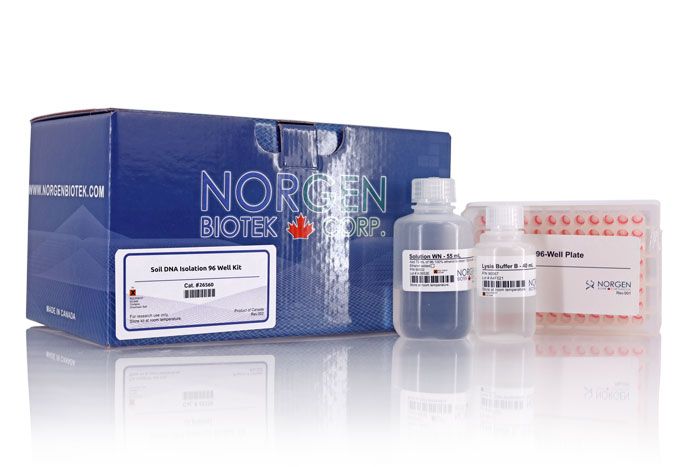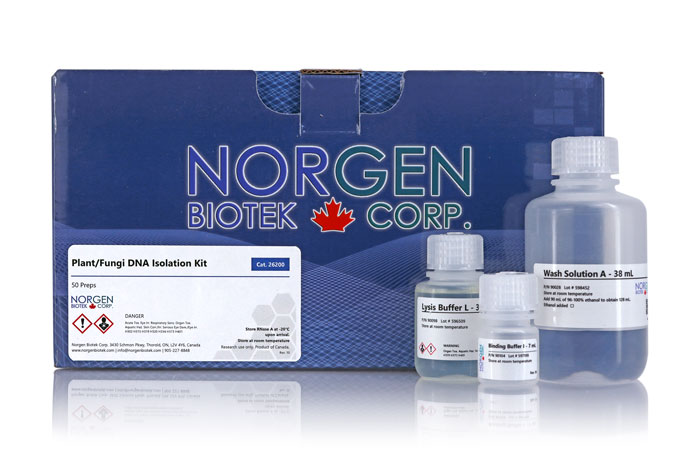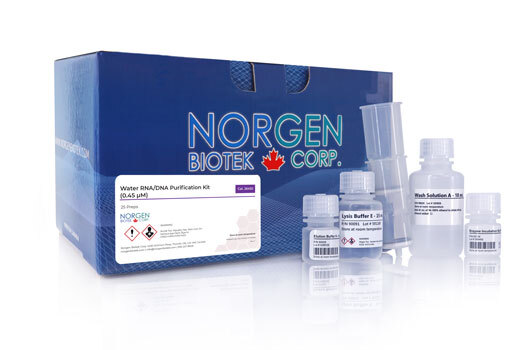Soil DNA Isolation 96-Well Kit

For research use only and NOT intended for in vitro diagnostics.
Soil DNA Isolation 96-Well Kit
Register today to receive an exclusive 15% off* on your first order.
Supporting Data
Figure 1. Consistent Yield of High Quality of Soil DNA. Total soil DNA was isolated from gardening top soil samples using Norgen's Soil DNA Isolation 96-Well Kit. For analysis, 10 µL from each 100 µL elution from 10 different wells was run on a 1.2% TAE agarose gel. Lane M is Norgen's High Ranger DNA ladder.
Figure 2. Consistent and high DNA quality. Total DNA was isolated from gardening top soil using Norgen's Soil DNA Isolation 96-Well Kit. For analysis of DNA quality, 3 µL from each 100 µL elution was used as the template in a real-time PCR reaction (SYBR Green) for the detection of the 16s rDNA. All DNA template from different wells showed a consistent Ct, indicating the consistent high DNA quality and yield. Black circle: NTC.
|
Kit Specifications
|
|
|
Binding Capacity Per Well
|
50 μg
|
|
Maximum Loading Volume Per Well
|
500 μL
|
|
Size of DNA Purified
|
All sizes |
| Maximum Amount of Starting Material |
250 mg
|
|
Time to Complete 96 Purifications
|
50 minutes |
Storage Conditions and Product Stability
All solutions should be kept tightly sealed and stored at room temperature. This kit is stable for 1 year after the date of shipment.
| Component | Cat. 26560 (192 preps) |
|---|---|
| Lysis Buffer G | 2 x 100 mL |
| Lysis Additive A | 25 mL |
| Binding Buffer I | 25 mL |
| OSR Solution | 12 mL |
| Wash Solution A | 2 x 38 mL |
| Elution Buffer B | 30 mL |
| Bead Tubes | 200 |
| HAR Plate | 2 |
| 96-Well Filter Plate | 2 |
| Adhesive Tape | 4 |
| 96-Well Collection Plate | 4 |
| 96-Well Elution Plate | 2 |
| Product Insert | 1 |
Documentation
FAQs
High Throughput
Poor DNA recovery could be due to one or more of the following:
- Homogenization was incomplete.
Depending on the type of soil, optimization of the homogenization with the flat bed vortex or bead beater equipment may be required. However, it is not recommended to increase the vortex time to longer than 10 minutes at maximum speed.
- Lysis Additive A was not added to the lysate.
Ensure that the provided Lysis Additive A is added to separate humic acid and increase DNA yield.
- 96-100% Ethanol was not added to the lysate.
Ensure that the indicated amount of 96-100% ethanol is added to the lysate before binding to the column.
- Ethanol was not added to the Wash Solution A.
Ensure that the indicated amount of 96-100% ethanol is added to the supplied Wash Solution A prior to use.
If the DNA does not perform well in downstream applications, it may be due to one or more of the following:
- Eluted DNA sample is brown.
The elution contains high humic acids. Ensure that the OSR Solution was added to the clean lysate, followed by the HAR plate step to remove humic acids.
- DNA was not washed with the provided Buffer SK and Wash Solution A.
Traces of humic acids or salt from the binding step may remain in the sample if the column is not washed with the provided Buffer SK and Wash Solution A. Humic acids and salt may interfere with downstream applications, and thus must be washed from the column.
- Ethanol carryover.
Ensure that the dry spin under the Wash procedure is performed and pat the bottom of the 96-Well Filter plate on a clean paper towel to remove the residual wash solution. Ethanol is known to interfere with many downstream applications.
- PCR reaction conditions need to be optimized.
Take steps to optimize the PCR conditions being used, including varying the amount of template (10 ng to 50 ng for 20 µL of PCR reaction is recommended), changing the source of Taq polymerase, looking into the primer design, and adjusting the annealing conditions.


